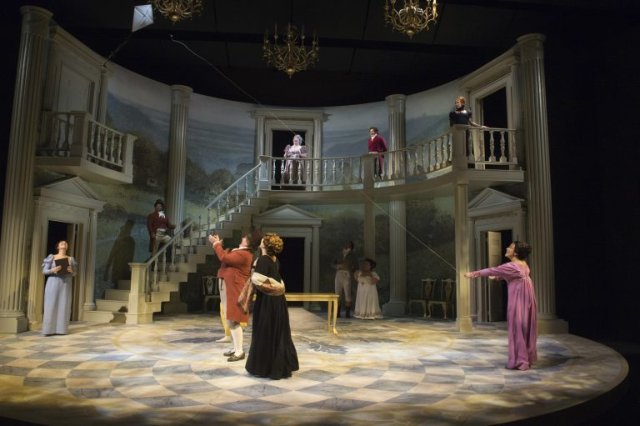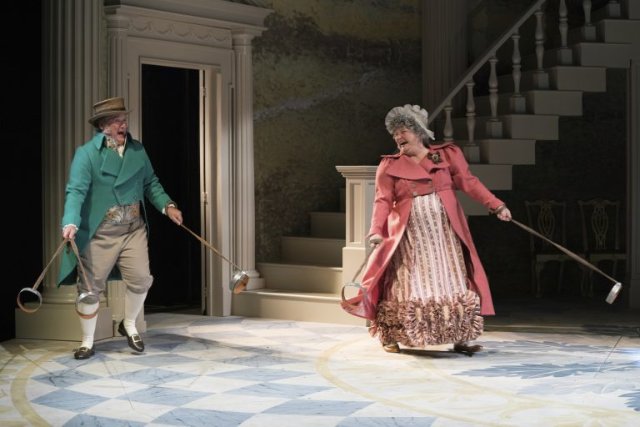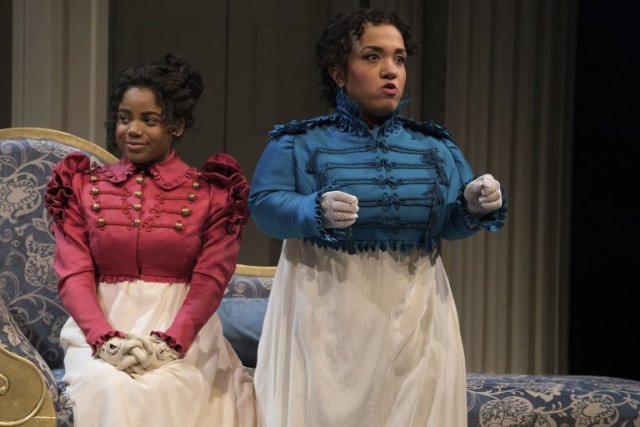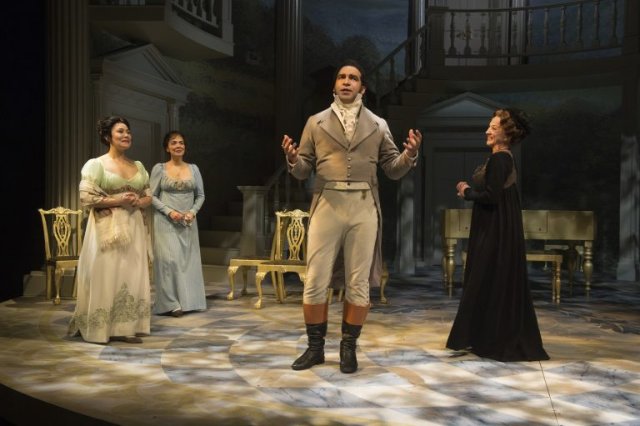Sense and Sensibility by Kate Hamill
Produced by Oregon Shakespeare Festiva
By: Victor Cordell - Mar 02, 2018
In the Jane Austen catalogue, Sense and Sensibility has always played poor sister to Pride and Prejudice. Perhaps it’s a marketing issue with the latter having the more powerful packaging (i.e.: its title). At the core of this story is a searing indictment of 19th century British laws, mores, and practices that contemporary feminists should cleave to in remembrance of the bad old days. The story is also full of deflecting humor, which made it approachable and acceptable in its own time as well as today. Oregon Shakespeare Festival has produced playwright Kate Hamill’s theatrical adaptation of the novel. The good news is that the result is pleasing to much of the crowd as a drawing room comedy. The bad news is that the bite of critical social commentary that makes it a great lesson is somewhat muted by the style of interpretation.
From the very outset, we understand the entrapment of women in the time of the play. Mr. Dashwood has died, and under English law, his wife and daughters cannot inherit his property. Thus, the gracious home that they have lived in passes to a half-brother of the sisters who intends to make the home his own. Although the deceased had instructed his son to provide well for his widow and daughters, the heir’s intended generosity is undermined by his miserly wife who convinces the feckless heir that assisting their move out of the house is sufficient generosity. Thus, the women are trundled off to live in a small cottage in distant Devonshire to fend for themselves.
Austen’s tone in her works reflected that of her day. Gentile manners and witty humor marked the social contract, and exceptions were decried. In Sense and Sensibility, middle sister Marianne Dashwood exhibits a notable deviation from standards with opinionated and confrontational behaviors too aggressive for a young lady of proper breeding. Many fictions of the time make room for a raucous, fun-loving character to needle society, and in this case, Mrs. Jennings is accorded that role. However, playwright Hamill acknowledges that she seeks to amp up the proceedings throughout, resulting in considerable over the top posturing with farcical treatment. But the attempt to draw roaring laughter acts to conceal the severity of the conflict and renders the play more one dimensional.
Apart from the inherent gender discrimination of the era’s law of primogeniture which impoverishes the Dashwood women, the story deals with men behaving badly. Because of the wild asymmetry between men’s and women’s rights, men are able to deceive and abuse women with impunity. With the exception of one gentlemen, each bachelor in this scenario reveals some degree of lack of character in courting.
Happily, the storyline does engage with several twists and turns, and key characters are empathetic. What’s more, director Hana Sharif carries out the playwright’s intent effectively, supported by a well-orchestrated cast who deliver high quality performances. Of the two key players, Emily Ota has the juicier part as the irrepressible Marianne, and she executes it well – saucy and sassy. Eldest sister Elinor, is the gravitational center. Guided by the weight of responsibility, she has yearnings just like her younger sisters but must modulate her behavior and conceal her own wounds. Nancy Rodriguez fills the role with great dignity and authority.
The production is handsome and well produced overall. However, one question which applies to this work but extends far beyond it is the notion of modernizing to make literature more relevant to the contemporary audience. In concept, the idea has merit, but in practice, it sometimes seems that the adaptation panders to a modern audience in a way that drags the art down to the audience rather than raising the audience to the art. This extends to the closing sequence, in which the cast dances and sings a modern pop number out of sync with the play.
One other issue is the staging. The fixed set beautifully represents the grand Dashwood home. But it also acts as the small cottage that the women move to, for which the unconcealed grand columns and sweeping staircase are inappropriate and distracting. Plays that are presented in repertory often must make concessions in stage design, but there are other solutions more appropriate for an otherwise well done production like this.
Sense and Sensibility is written by Kate Hamill, based on the novel by Jane Austen, produced by Oregon Shakespeare Festival, and plays at its Angus Bowmer Theatre, 15 S. Pioneer St., Ashland, OR, in repertory through October 28, 2018.
Posted courtesy of For All Events.




